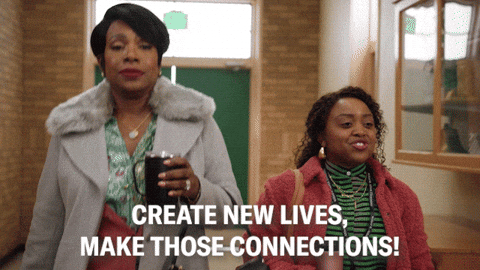👩🏽🏫 Teachers, Not Time Travelers 🕰️
Use Your Critical Thinking 🧢, not your 🔮, when considering "AI" in education.

"Ronald Reagan? The actor? Ha! Then who's vice-president, Jerry Lewis? I suppose Jane Wyman is the First Lady?" - Disgraced Nuclear Physicist Dr. Emmett Brown, Back To The Future.
The dialogue around generative "AI" in education often centers on a future where effectively using "AI" is an essential skill without which people will be unemployable. Some of the rhetoric around this belief includes:1
Today's students will retire in the 2070s and 2080’s meaning a 10-year-old will graduate high school in 2032 and college in 2036.
Today's AI models are the most rudimentary ones our students will ever use.
Students solely exposed to a traditional education system will find themselves unprepared to tackle future challenges. We must transform our schools into this AI era.
Notice the the future-tense "will" in all of those.
Teachers, Not Time Travelers
The message I take from this dialogue is that teachers must join with those who predict "AI" will fundamentally transform society. That means that teachers and schools base their pedagogy on this prediction (assumption).
Predictions Are Often Wrong
As illustrated above, Doc Brown was wrong when predicting 1985's political climate. Let's explore how predictions play out.
The History Of Technology Predictions
Our past is rife with incorrect predictions of people writing off technology that wound up being omnipresent.
As Adam Johnson said on the Citations Needed podcast (at 5:43), no one wants to be David Letterman in this video with Bill Gates rejecting the idea that the internet would be useful.
At the same time, you are not reading this using Google Glass or the Apple Vision Pro.2 You don't teach students in the Metaverse. You are not paid in cryptocurrency. Your retirement fund is not a portfolio of NFTs. You don't drive to work in a self-driving car.
No one wants to be Paris Hilton or Jimmy Fallon singing the praises of NFTs.
Similarly, no one wants to be Bill Clinton, sitting on stage with Sam Bankman-Fried. Imagine the shame of Roger Parloff, who apologized after writing a puff piece about Elizabeth Holmes and Theranos, a company whose secrecy and NDAs are reminiscent of OpenAI.
So tech predictions are dicey at best. Let's continue with some more presidential politics-themed predictions.
Recent Incorrect Predictions
Imagine if Marty McFly drove the DeLorean to the year 2000 and told someone there the presidents from January 2009 through January 2021 would be Barack Obama (who???) and Donald Trump3 (the real estate guy???). Could anyone have predicted those outcomes in 2000?
This summer, news media weighed in as Vice President Kamala Harris considered her running-mate options. Which former Social Studies teacher and Gay-Straight Alliance advisor is missing from these YouTube thumbnails?
Neither CBS News, The Associated Press, The New York Times, Politico, nor MSNBC (top 3 options!) predicted that Minnesota Governor Tim Walz was even a top contender to be Harris's running mate!
Looking at these incorrect predictions gives me solace. I have made so many over the years. On March 9, 2020, I wrote, “The fears over Coronavirus may be more hype than substance.” One prediction I especially regret is advocating teachers use Google Expeditions on iPads. Inherent to that argument is the assumption that the Google Expeditions would be around for a long time. Less than three years after I wrote about the greatness of Google Expeditions on iPad, Google announced Expeditions was headed to the graveyard. I feel terrible if any schools purchased iPads based on what I wrote about using them for Google Expeditions.
How many times have we seen fads in education come and go? Personalized learning, PBIS, MOOCs, and learning styles are among the many.
Finally, in the thirty states4 where sports betting is legalized, bankruptcies have increased by 28% compared to states where it is banned which tells us about our ability to predict sports outcomes.
Do you see why basing pedagogical decisions on the ability to predict the future is fraught at best?
Why AI Predictions Should Not Inform Pedagogy
What about "AI" and education rhetoric hinging on predictions?
Students in our schools right now will retire in the 2070s and 2080s.
Most students born in 1960 graduated high school in 1978 and college in 1982. Most students born in 1985 graduated high school in 2003 and college in 2007.
We can always roughly calculate when people will graduate high school, college, and retire by adding 18, 22, and 65 to their birth year.
This non-sequitur tells us nothing about whether we should or should not adjust schooling to respond to “AI.”
Today's AI models are the most rudimentary ones our students will ever use.
This argument often says that today's generative "AI" is Pong and is presumably destined to evolve into Super Mario Bros, The Legend of Zelda, NHL '94, and peaking with Madden '04.
Pong was not released to the public after billions of dollars of venture capital and tech giant funding and decades of research.
Pong did not have the inherent problems of generative AI listed by Ed Zitron at 14:08 of this episode of Better Offline.
"The problems are problems that aren't necessarily just technological. They're physics, they're mathematics. These aren't things you can just outrun." - Ed Zitron, Better Offline, April 10, 2024.
Its "hallucinations."


We must transform our schools into this AI era.
This centers schools as the problem when we consider "AI." Not AI companies such as OpenAI. There are legitimate issues with public K-12 schools in the US:
School shootings (not schools' fault - extremely lax gun laws cause this).
Segregation driven by government policy including redlining and funding schools with local property taxes.
Teachers are underpaid.
Many states do not have legally empowered teachers’ unions.
Standardized testing (not schools' fault - federal and state laws cause this).
Student tracking.
Excessive student workloads.
Book banning (state laws cause this).
When considering American K-12 schools' problems, "They are not responsive to AI" is not one of them.
I have heard the "We must transform" argument said another way, "Classrooms are getting kids ready for 1985."5
This argument makes me want to mount an Atticus Finch-like defense of falsely accused teachers. I will spare the reader but say that as someone who attended high school ten years after 1985, the classrooms I taught in and have worked with since 2003 look nothing like those I attended in 9th through 12th grade.
Teachers deserve better than being told their hard work is not preparing students for their post-K-12 years.

Speaking of preparing students for their post-K-12 years…
Wear Your Critical Thinking 🧢
Unless you own a flux capacitor-equipped DeLorean capable of reaching 88 miles per hour, you don’t know the future. Instead of the impossible skill of prediction, focus on critical thinking. This skill is always valuable for teachers and students.

Critical thinking about the future of "AI" includes questions such as:
Will "AI" skills become invaluable when capitalist institutions such as Goldman Sachs and the RAND Corporation have joined the chorus of voices raising concerns about "AI"?
Is students’ future employment tied to a technology that depresses purchasing decisions when mentioned in product descriptions?
What can we learn from the widespread acclaim Procreate CEO James Cuda received when he said, “I really f***ing hate generative AI” and announced the app will have no AI features?
Why are we basing pedagogical decisions on an environmentally unsustainable technology?
Why must we “transform our schools” around a technology that violates US copyright law? As Former General Counsel, U.S. Copyright Office Jacqueline Charlesworth wrote in the Yale Law Journal, “…Each of the four factors of section 107 of the Copyright Act weighs against AI's claim of fair use, especially when considered against the backdrop of a rapidly evolving market for licensed use of training materials.”
Why are teachers asked to change pedagogy around ChatGPT and Google Gemini when both are unavailable to students younger than 13 and require guardian permission for students aged 13 to 18?
Why aren't predictions that there might not be enough data to sustain generative "AI" not as valid as predictions "AI" will revolutionize society?
Can we wait until the inherent problems with generative "AI" are solved before we change instruction to accommodate it?
Can we wait until generative "AI" shows any ability to generate a profit before declaring that effectively using it is the skill all students need?
When considering generative "AI" in the classroom, please wear your Critical Thinking 🧢. As someone in K-12 education, you have great critical thinking skills. However, as awesome as your critical thinking skills are, your ability to predict the future is lousy, just like everyone else.

"If we want school to have a positive effect on children's futures, we need to spend more time thinking about what's happening in schools in the day-to-day, moment-to-moment present, rather than gaming out an indefinite unknown. - Author John Warner, September 1, 2024.
Continuing The Conversation
What do you think? How are you using critical thinking to address “AI” this school year? Comment below or Tweet me at @TomEMullaney.
Does your school or conference need a tech-forward educator who critically examines AI and pedagogy? Check out my professional development offerings, reach out on BlueSky, or email mistermullaney@gmail.com.
Post Image: The blog post image is from Back To The Future Trilogy on Pexels.
AI Disclosure:
I wrote this post without the use of any generative AI. That means:
I developed the idea for the post without using generative AI.
I wrote an outline for this post without the assistance of generative AI.
I wrote the post from the outline without the use of generative AI.
I edited this post without the assistance of any generative AI. I used Grammarly to assist in editing the post. I have Grammarly GO turned off.
There are no generative AI-generated images in this post.
Critical Inkling is a reader-supported publication. To receive new posts and support my work, consider becoming a free or paid subscriber.
I am not sharing the names of those promoting these arguments because this post is a critique of ideas, not people.
Unlike the other hype cycles referenced in this paragraph, the hype around the Apple Vision Pro died quickly.
Trump briefly ran for the Reform Party’s nomination that year, ending his campaign in February. I do not remember anyone seriously considering him a potential future president.
And Washington, DC, and Puerto Rico.
I am critiquing ideas, not people. No names.




